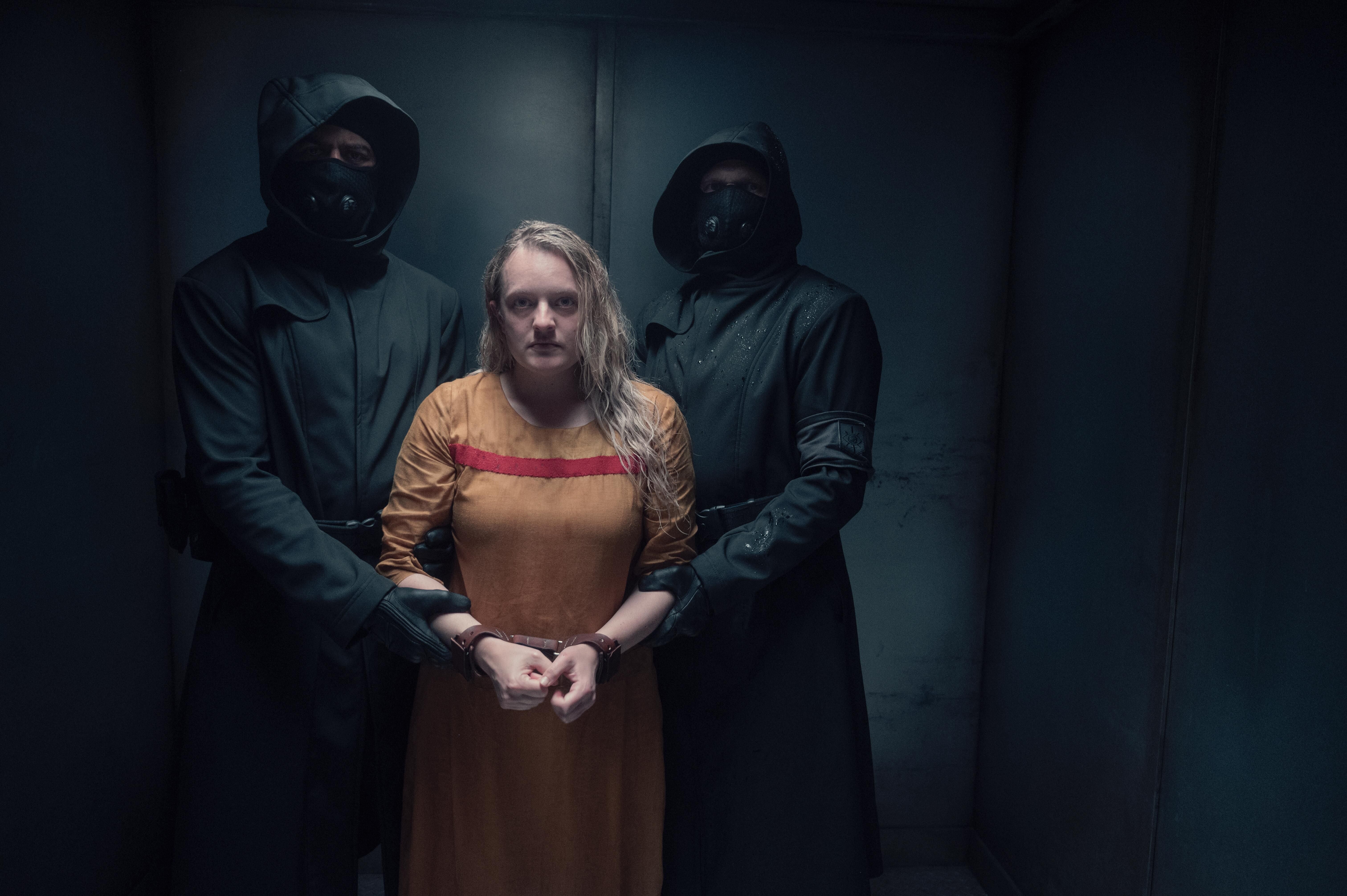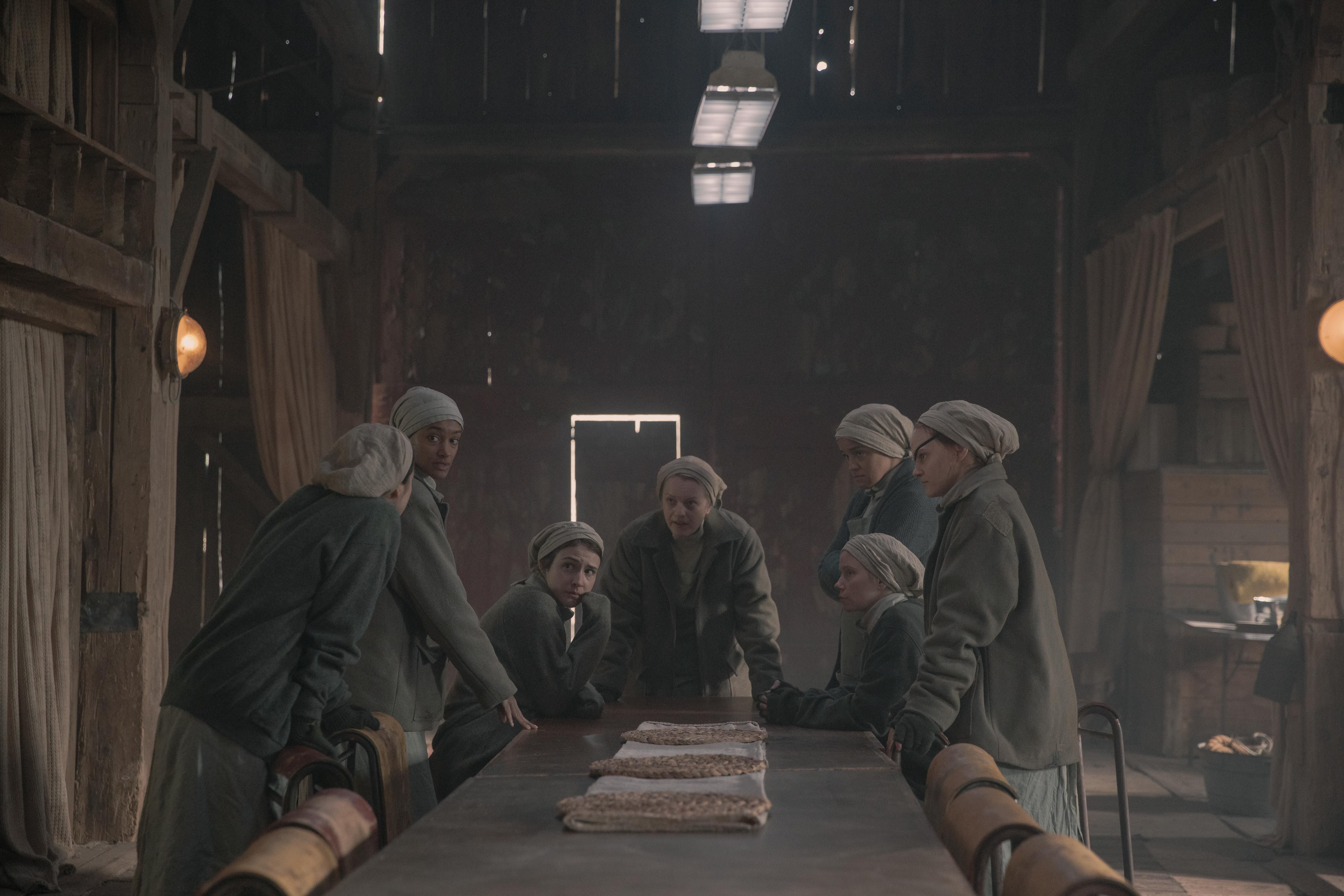Since the beginning, the Hulu drama The Handmaid's Tale has been award-winning and critically acclaimed, but never immune to criticism. This is especially true of the aspect which proves most alienating to so many — the unceasing brutality put on screen to make it clear that the dystopian world of Gilead is not messing around. In this alternate reality where the United States has fallen to the control of religious extremists, there hasn't been much hope available to those trying to escape the new society. But while the show's fourth season, which premieres on April 28 with three episodes, doesn't pretend that the world is suddenly a better place, it does somehow create the sense that maybe dreams of a better future aren't totally futile.
People look at you funny when you identify as a fan of The Handmaid's Tale. Believe me, I know, to the point where I always hesitate to describe it as one of my favorite series, even though I've seen every episode of the series multiple times, and the book upon which it's based is a lifelong obsession. I first discovered Margaret Atwood's novel in high school, and in the years since I've read it countless times; it's a touchstone for me for so many reasons, including the way it says the quiet part loud about the ways society has of putting a woman in her place, of defining her worth. While the drama of that appealed to me as a teenager, the realness of it never stopped feeling resonant as I got older — something only compounded by the fact while the show was originally greenlit during the Obama administration, it premiered just as Trump's time in the White House was beginning.
The Handmaid's Tale began as a relatively straightforward adaptation, focusing on June (Elisabeth Moss), a woman valued only for her increasingly rare and valuable ability to gestate children struggling to survive the nightmarish regime in power. Over each subsequent season, though, the world of the series has expanded well beyond the framework of Atwood's original text, while June has also evolved from the role of survivor to fighter, finding increasingly louder ways to rebel against the forces which have made her a prisoner of the state.
It's a change that has transformed the show, but led to legit questions regarding June's ongoing ability to still be alive after bombings and beatings and sexual assaults and gunshots. In a recent TCA panel, when asked about this, showrunner Bruce Miller was quick to say that there is no show without the character, telling critics: "Did I consider killing June? No. The show is called The Handmaid's Tale. It's about her."
It's a fair question given what's unfolded over the past few seasons — how many more times can June subvert the rule of Gilead and live? How much more torture can she take? But the most exciting thing about Season 4 is how it completely reframes those questions. Hulu has provided the first eight episodes to critics for review, which isn't necessarily typical for a weekly release like this one. But without getting into spoilers, there was a very good reason to do so.
When Hulu first announced that The Handmaid's Tale would be adapted as a TV show, one element that wasn't originally clear was if the plan was to adapt it as an ongoing or limited series. At the time, I remember thinking that a limited series made more sense, because the book's ending is a pretty solid conclusion to the story of its titular character, while also making a fascinating point about the nature of history, and the role ordinary lives play in it.
In the book, the narrator — never officially named June — ends her recounting of events with her removal from the Commander's home, made possible by her lover Nick and his connections to the Eyes. After her final lines (And so I step up, into the darkness within; or else the light), an epilogue reveals that the "text" we've been reading was transcribed from cassette tapes discovered long ago in Maine, recorded by "Offred" following her escape. The epilogue, referred to as the "Historical Notes," goes on to explain how Offred's story fits into the year 2195's understanding of the early days of Gilead, now over two centuries in the past. What Offred recounts in the novel is treated as just one first-person perspective on history, logged as an artifact of its time. She is not a hero, her real name forgotten — a deliberate choice on Atwood's part.
Those cassette tapes, by the way, are a fascinating detail when it comes to the show's relationship to the original book. One of the very first things you hear in the very first episode of the show is the distinctive *click* of a plastic button being pressed to record, followed by the beginning of June's voice-over, much of which is prose drawn directly from Atwood. (While the use of Atwood's original words has dwindled since then, even Season 4 does still contain echoes of it.)
However, while the cassette tapes are incorporated as canon by that click, the show does eventually split from the idea that all the voice-over we hear of June's thoughts is being recorded by her at some future date, from some safe hidden place in the future. Instead, the cassette tapes are (sort of) addressed in Season 3, Episode 5, "Unknown Caller," when June uses an old mixtape belonging to her new Commander to record a secret message for her husband Luke (O-T Fagbenle), smuggled into Canada by Serena (Yvonne Strahovski). It's not quite a retcon and not quite a recontextualization of June's voice-over up until that point; it instead hovers in a grey area. And since that point, whenever voice-over is used, the implication is no longer that these are June's reflections on times past. It's her living in the here and now.
This removes the voice-over as an indication that June will one day make her escape and be able to tell her story, but June's power in this world now extends beyond her telling her own story. After the events of Season 3, June is no longer anything resembling a lost and nameless ghost of Gilead; she's now Public Enemy #1 to that tyrannous state, a hero to countless others, and capable of committing violence on a new scale. After Season 3, I wrote about why I felt the show should push June more into the realm of anti-hero, but, spoiler alert, June does not go full Breaking Bad in Season 4. (Hell, she doesn't even consider growing a goatee.) That said, the show does now seem in active dialogue with June's darkest impulses, as well as the emotional costs that come with them.
And that leads to perhaps the largest issue hanging over the show's existence: Where does this all go? While Season 4 may be trying to making the case for the show's continuation, what's not totally clear is how sustainable this path really will be. Yes, you could argue that by sheer virtue of reaching Season 4, it's proven its ability to stretch beyond the original framework of the book and remain compelling, and over the years its increased focus on the ensemble cast and their journeys has provided plenty of additional material. But long before the Season 4 premiere, Hulu gave Season 5 the go-ahead, and during that recent TCA press conference Moss, Miller, and executive producer Warren Littlefield gave no indication that they felt that would be the end of things.
There's no way now that June will be met with the deliberately ambiguous fate of Offred in Atwood's book, the one that I imagined working just fine as the ending of a limited series. The advantage of telling stories is that you get to decide when to end them, and it's that timing which plays a major role in determining if an ending is happy or not. But, that said, what does an ending even look like for The Handmaid's Tale, happy or otherwise? The destruction of Gilead and restoration of America? A miraculous surge in the birthrate? Everyone reunited with the loved ones from whom they've been separated? What Season 4 makes clear is that there's no pat ending in the works, but that doesn't mean things are totally dire, and while victory might never be possible, justice could be.
Plus, say this for three full seasons of torture and despair — there's plenty of justice we as viewers still need to see doled out. Enough to warrant more seasons beyond a fourth? It's hard to say as yet. But those who have seen the previous three seasons and choose to come back for more, brace yourselves, because you can still expect this show to dig into the darkness, as much as ever. But you might be shocked as well, to also feel something rare and precious and new: Hope.
The Handmaid's Tale Season 4 premieres Wednesday, April 28 on Hulu with three new episodes. New episodes follow weekly.



